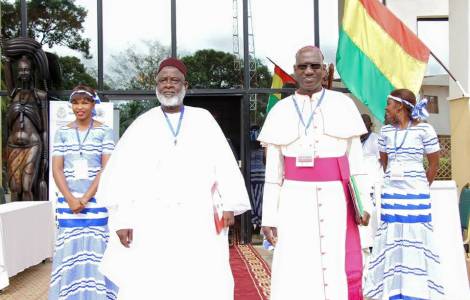
visionguinee.info
Conakry (Agenzia Fides) - Between Mali, Sierra Leone and the Atlantic Ocean lies Guinea with its capital city of Conakry, the northern part of the country bordering equally on one corner of Guinea Bissau and one of Senegal. The West African country has seen three consecutive coups d'état since gaining independence from France in October 1958: the first in 1984, another in 2008, and the last in September 2021. The latest, bloodless coup d'état joins a new wave of coups which characterizes several African countries, particularly in the West African Sahel region, and which took place mostly without bloodshed and with some popular support. The coup in Guinea follows the two in Mali (August 2020 and May 2021) and Chad (April 2021). An exception is the coup d'état in Sudan in October 2021, which ended a democratic experiment with a government made up of 50% civilians for the first time, followed by a crackdown by the military junta and today the well-known dramatic situation prevails.
The coup d'état in Guinea in September two years ago ended the government of President Alpha Condé, who had just been re-elected to a hard-fought third term, and brought Mamady Doumbouya to power.
A year and a half after this abrupt change in Guinean politics, the country has been reeling from riots over demonstrations organized by the opposition, tired of waiting for elections and progress in the transitional period promised by the junta. In this situation, Bishop Raphaël Balla of N'zèrèkore, interviewed by Fides, points out that in the country, which is among the least developed in Africa, some things are nevertheless going well: "The military is working and the results are visible: the roads, the infrastructure are starting to work", he stresses, "As for politics, those in the opposition a short transition and an acceleration of the process. They also complain about the imprisonment of leaders, even if, thanks also to the mediation of the Archbishop of Conakry Vincent Coulibaly, there have been various releases lately". According to Bishop Balla, one should also know that opposition demonstrations sometimes block the country: "People cannot work, children have difficulty going to school". "But inland, where I live, for example, about 1,000 km from the capital, there are no problems from this point of view," reports the bishop, who admits that in his country, as in other countries in the region, the putschists enjoy some support from the population: "People are on the side of this junta. Even when there are demonstrations against the junta, there are always those supporting the military."
In addition, "there seem to be political leaders abroad who are manipulating the population and there are reports that young people are being paid to go out on the streets and demonstrate, and that's not good". Bishop Balla counts the general improvement in the situation in the capital Conakry and the development of the infrastructure as one of the positive signs of change: "The road network has improved and the old electricity problem has now almost been solved in several cities. Where I live, the electricity works perfectly, as well as in the capital and other cities. Until a few years ago, the supply was very bad. New houses are being built according to modern criteria, and the economy is improving. In addition, I can assure you that for the most part infrastructure is built with the country's own funds and not with external funds. The children all go to school, which is considered by everyone to be fundamental. This is also the reason why the population views demonstrations with suspicion, because they see the normal course of the teaching," said the bishop about the progress.
Although the Catholic community is a minority in the population (85% Muslim, 10% Christian, of which 8% are Catholic, the rest are adherents of sects and local tribal religions), but it is heard in the country, also on a socio-political level. "The representatives of the Catholic community," reports Bishop Balla, "interfere in public affairs, always together with the Muslims. When there are problems, politicians or the population turn to Archbishop Vincent Coulibaly and Grand Imam El Hadj Mamadou Saliou Camara (Photo together, ed.) These two religious leaders are often invoked when mediation is needed. And it's not just happening now, but it also happened under Alpha Condè. People are listening to them."
"The Leading Representatives of the Catholic community have always been open to inclusive dialogue, in which everyone can contribute, in order to promote the growth of the country”, the bishop concluded. "It is also the reason why the Archbishop and the Imam have campaigned for the release of the imprisoned opposition leaders. The country needs a new constitution, which the interim parliament has to draft, and everyone is needed for that. The Catholic community is also represented in this Parliament".
In fact, the authorities that set the selection criteria for the transitional parliament have also asked the Catholic and Islamic communities to express their representatives. (LA) (Agenzia Fides, 27/5/2023)